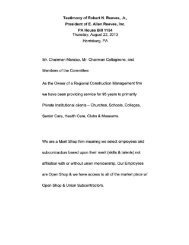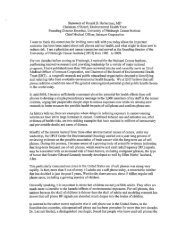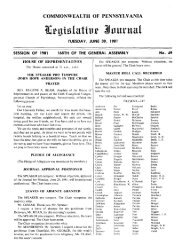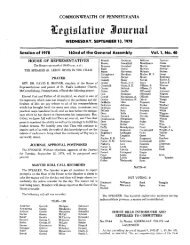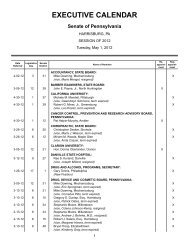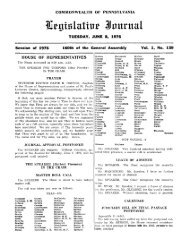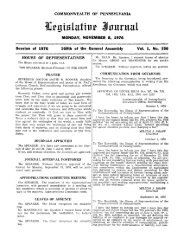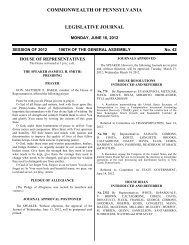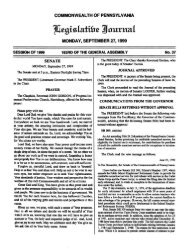Kristie Wolf-Maloney - The Pennsylvania General Assembly
Kristie Wolf-Maloney - The Pennsylvania General Assembly
Kristie Wolf-Maloney - The Pennsylvania General Assembly
You also want an ePaper? Increase the reach of your titles
YUMPU automatically turns print PDFs into web optimized ePapers that Google loves.
<strong>The</strong> fiscal guarantee, $150 million cash collateral and $50 LOC, is a<br />
falsehood; the maximum the Lottery could ever draw in a single year is<br />
$95.9 million.<br />
<strong>The</strong> "guarantee" does not exist as the Commonwealth has asserted because the<br />
Manager's Security and LOC have a maximum allowable withdrawal. <strong>The</strong> PMA<br />
stipulates that at no time may the cash withdrawal (or direct payment by Camelot to the<br />
Commonwealth) for failed APC's be greater than 5% of that year's "profits. " While the<br />
total amount of the proposed fund is $200 million, there is no scenario of profit<br />
shortfalls where the Commonwealth could withdrawal the entire amount, even if the<br />
total profit miss was $200 million or more in a single year. Let's explore an example of<br />
Year 1 from the PMA:<br />
Assuming the plan to privatize moves forward, and the bid is awarded to<br />
Camelot. Fast-forward to the end of Year 1 of their contract, June 2014, but things did<br />
not go as planned. Camelot did not deliver on its full Annual Profit Commitment of<br />
$1.13 billion. Despite strong sales revenues, cost overruns and slower than expected<br />
rollouts of gaming expansions led to a delivery of profits totaling $924.96 million. While<br />
this would be a strong performance for a state lottery (as strong as net revenues for the<br />
PA Lottery in 2009-10), it would be 18% under Camelot's guarantee for Year 1. <strong>The</strong> total<br />
amount of the shortfall of the profit commitment would be $203 million. However, due to<br />
the PMA and federal law, the most the Commonwealth could draw from Camelot or its<br />
security fund is $46.3 million. This is a $156.7 million shortfall that the State Lottery<br />
Fund and possibly <strong>General</strong> Fund would be on the hook to make up to fund senior<br />
programs, despite the $200 million Manager's Security.<br />
In fact, the most money under any scenario the administration could expect from<br />
Camelot as a penalty for a failure to make its Year 1 Profit Commitment is $53.7 million,<br />
which is consistent with profits 4. 77% lower than the commitment.2 3<br />
Of all the scenarios we investigated, the maximum draw from the Manager'&<br />
Security would be $95.9 million in Year 20 if Camelot delivered profits 4.77% lower than<br />
its guarantee. <strong>The</strong>refore, this is the maximum guarantee available to the<br />
Commonwealth for its APC, not the $200 million it has so often asserted,<br />
This $95.9 million guarantee from Camelot to support missed projected sales is<br />
half of what exists today in the State Lottery Fund. This informal reserve has backed<br />
2 Appendix 2 - Full Report<br />
3 Assumes implementation of "27% Law" Outline in Commonwealth's PMA<br />
4



